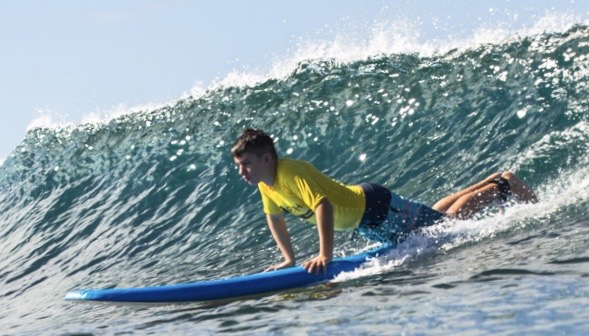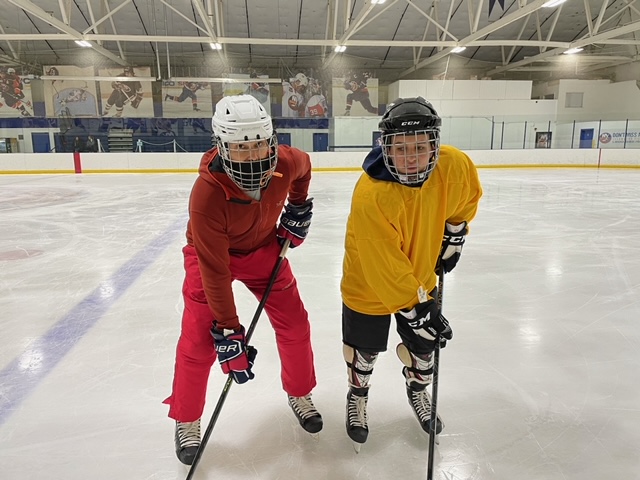Surfing and blind hockey has given 17-year-old Drew Basile confidence to do almost anything.

As a middle school health and physical education teacher in the Brooklyn, New York area, Lauren Basile has always believed kids should be physically active. Her son Drew is no exception.
But after Drew was born with Optic Nerve Hypoplasia, an eye condition that causes underdevelopment or an absence of the optic nerve, Lauren wasn’t sure how to involve him in sports or other activities.
Drew also has nystagmus, an involuntary motion of the eyes. Doctors told Lauren her son would be totally blind, but that hasn’t proven to be the case. He has no vision in his left eye, but has limited useable vision in his right.
Like most parents, Lauren was scared and unsure of how to raise a blind child. Her mind was filled with questions. How would he function? Will he be able to get a job when he grows up?
“I was a total freak, looking for everything and trying to get him to see me and do things,” she recalled. “Then I realized, ‘OK, it’s not so bad’. I was totally ignorant to blindness before he was born. But now, it’s just this little inconvenience.”
Once the shock and fear wore off, Lauren set about encouraging Drew to try basic activities such as riding a bike. She discovered Camp Abilities in Long Island, a sports camp for children with visual impairments. Shortly after the camp was over, Lauren received an email about a surf outing they were having. Skeptical at first, she decided to let Drew give it a try.
“He did excellent. He’s been pretty much surfing ever since.”
Drew became involved with Surf for All, a nonprofit dedicated to providing accessibility to anyone wishing to explore the ocean. He attended one of their camps, and got invited back. In 2018, he took a surfing trip to Puerto Rico, which was paid for by Surf for All. It’s an experience he’ll never forget.
“I had a great time surfing,” Drew said. “Ever since I set foot on that board, I’ve been surfing. I eat, breath and sleep surfing.”
Drew was introduced to another sport through the surfing camp. A parent told Lauren about blind hockey and that there was a team on Long Island.
In blind hockey, rules are slightly modified to accommodate the blind and visually impaired. The puck is bigger than a traditional puck and makes noise. Players with higher vision typically play forward, those with lower vision play defense, and totally blind players can play goalie or on defense.

Drew didn’t have much skating experience, but did well after giving the sport a try. He is a part of the New York Metro Blind Hockey team and attends their practices, but is still learning to skate and hasn’t played in a game yet.
Taking part in both sports has given Drew the confidence and ability to be active, just as his mom had always hoped.
“They’re both high intensity (sports),” Drew explained. “They have helped me be active and get out there meeting people. I’m doing what I love.”
Drew resented his visual impairment at a young age. He didn’t like being viewed as “different.” But as time went on, he realized he could still achieve what he wanted, whether in sports or everyday life.
“Growing up around sighted kids, it was OK because I could still do everything everyone else could do. I just do it a little bit differently. When people ask me, I tell them.”
Ted Caputo, a past president of New York Metro Blind Hockey, told Lauren and Drew about the Foreseeable Future Foundation. He encouraged Drew to apply for a scholarship to take skating lessons, which could increase his chance of becoming a regular part of the team.
Drew received the scholarship, but didn’t quite believe it at first.
“My mom texted me while I was at school that I got awarded. I thought I had read the text wrong and read it again. I was jumping for joy inside.”
It took Lauren a while to find someone who would give Drew skating lessons. She finally found a teacher in Prospect Park, and his skills are gradually improving.
“Drew’s getting a lot better, but not at the level to be playing yet,” Lauren said.
Nevertheless, Drew is optimistic about his chances. Asked which sport he is most passionate about, he says it’s a draw. He has the best of both worlds, getting to play hockey during the fall and winter while surfing in the spring and summer. Either way, he can’t imagine a life without sports.
“I’d be lost if I didn’t have adaptive sports. I wouldn’t really be able to do anything. It’s amazing they have these adaptive sports for people with low vision or people with total blindness.”
Drew is about to complete his senior year of high school, and plans to attend St. Thomas Aquinas University and study the hospitality industry. Adaptive sports will still be a major part of his life moving forward.
“I’d love to keep doing surfing and hockey, and I’d be happy to try any other adaptive sports that are out there. Maybe I can even incorporate some of that into the college I’m going to, maybe get a beep baseball or goalball team going. It’s worth a try.”
